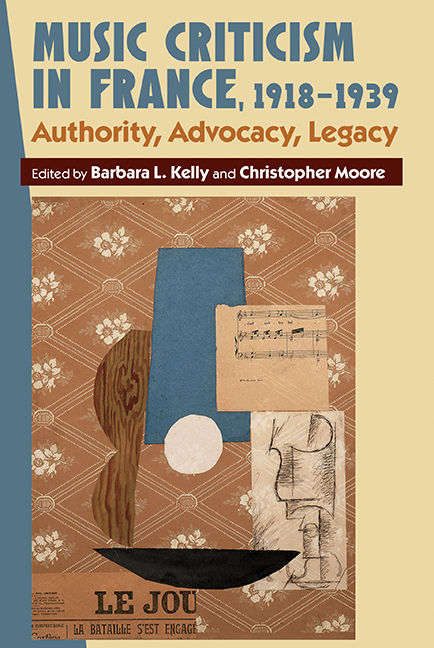Book contents
- Frontmatter
- Contents
- List of Figures
- List of Tables
- List of Contributors
- Acknowledgements
- Introduction: The Role of Criticism in Interwar Musical Culture
- 1 Music Criticism and Aesthetics During the Interwar Period: Fewer Crimes and More Punishments
- 2 Nostalgia and Violence in the Music Criticism of L'Action française
- 3 Charles Koechlin: The Figure of the Expert
- 4 Bleu-horizon Politics and Music for Radio Listeners: L'Initiation à la musique (1935)
- 5 Common Canon, Conflicting Ideologies: Music Criticism in Performance in Interwar France
- 6 Arthur Honegger: Music Critic for Musique et Théâtre (1925–1926)
- 7 A Woman's Critical Voice: Nadia Boulanger and Le Monde musical, 1919–1923
- 8 From a Foreign Correspondent: The Parisian Chronicles of Alejo Carpentier
- 9 Debussy's ‘Reputational Entrepreneurs’: Vuillermoz, Koechlin, Laloy and Vallas
- 10 The Legacy of War: Conceptualising Wartime Musical Life in the Post-War Musical Press, 1919–1920
- 11 Satie, Relâche and the Critics: Controversies and Legacy
- 12 Creating a Canon: émile Vuillermoz's Musiques d'aujourd'hui and French Musical Modernity
- Selected Bibliography
- Index
12 - Creating a Canon: émile Vuillermoz's Musiques d'aujourd'hui and French Musical Modernity
Published online by Cambridge University Press: 17 July 2019
- Frontmatter
- Contents
- List of Figures
- List of Tables
- List of Contributors
- Acknowledgements
- Introduction: The Role of Criticism in Interwar Musical Culture
- 1 Music Criticism and Aesthetics During the Interwar Period: Fewer Crimes and More Punishments
- 2 Nostalgia and Violence in the Music Criticism of L'Action française
- 3 Charles Koechlin: The Figure of the Expert
- 4 Bleu-horizon Politics and Music for Radio Listeners: L'Initiation à la musique (1935)
- 5 Common Canon, Conflicting Ideologies: Music Criticism in Performance in Interwar France
- 6 Arthur Honegger: Music Critic for Musique et Théâtre (1925–1926)
- 7 A Woman's Critical Voice: Nadia Boulanger and Le Monde musical, 1919–1923
- 8 From a Foreign Correspondent: The Parisian Chronicles of Alejo Carpentier
- 9 Debussy's ‘Reputational Entrepreneurs’: Vuillermoz, Koechlin, Laloy and Vallas
- 10 The Legacy of War: Conceptualising Wartime Musical Life in the Post-War Musical Press, 1919–1920
- 11 Satie, Relâche and the Critics: Controversies and Legacy
- 12 Creating a Canon: émile Vuillermoz's Musiques d'aujourd'hui and French Musical Modernity
- Selected Bibliography
- Index
Summary
In 1923, Émile Vuillermoz published his book Musiques d'aujourd'hui, prefaced by his teacher Gabriel Fauré, with Éditions Crès et Cie. The printing of the book was completed on 15 February 1923 (as indicated on its last page) and it was distributed during the following weeks; it attracted attention from the musical and intellectual milieu from the time of its publication, as inferred by Georges Auric's review for Les Nouvelles littéraires dated 10 March 1923. Its content would have been broadly familiar to Auric and his contemporaries, since it was essentially a compilation of critical texts that had already been published in Le Temps and other newspapers between 1920 and 1922 (see Table 12.1).
The aim of this chapter is to contextualise and analyse Vuillermoz's exegetical undertaking in Musiques d'aujourd'hui. The history of early twentiethcentury French music has been taught in such a way that Gabriel Fauré, Claude Debussy and Maurice Ravel are generally seen as occupying the higher echelons of musical achievement. Notwithstanding their musical qualities, the reasons for this situation are also based on a lengthy process of canon formation. This practice, as with every artistic canon, presupposes a constant effort by critics to assert artistic value and ensure an institutional presence that reflects a form of cultural capital (to adopt Bourdieu's concept).
In light of this, the role that some canonisers were driven to play in the process of ascribing value deserves close scrutiny. Vuillermoz is a significant example from the musical field of the first half of the twentieth century, writing on music until shortly before his death in 1960, with his last works on Debussy and Fauré. Critical studies of how France's musical canon was discursively elaborated during the interwar period have been undertaken in recent years by several colleagues whose work is included in this book. I propose to adopt a more focused view of this process here in relation to the publication of Musiques d'aujourd'hui. The chapter concludes with a consideration of Theodor W. Adorno's categories of musical attitudes: the expert, the good listener and the consumer as a way of exploring the critic, reader/music-listener relationships, which Vuillermoz was keen to address in Musiques d'aujourd'hui.
- Type
- Chapter
- Information
- Music Criticism in France, 1918–1939Authority, Advocacy, Legacy, pp. 293 - 316Publisher: Boydell & BrewerPrint publication year: 2018
- 3
- Cited by



